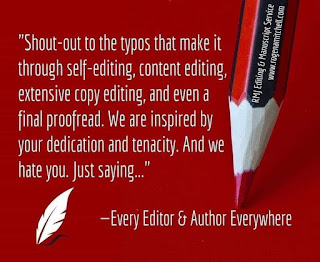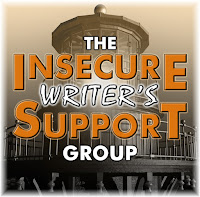Welcome
readers, writers, authors, and bloggers!
We're
glad you're here! It's the First Wednesday of the month; when we
celebrate IWSG Day in the form of a blog hop
featuring members and guests of the Insecure Writer's Support Group. Founded by author Alex Cavanaugh (Thank
you, Captain!) and fostered by like-minded associates, IWSG is a comfortable
place to share views and literary news as we record our journeys. Check out the
December newsletter here.
The awesome co-hosts for the December 6TH posting
of the IWSG are C. Lee McKenzie, JQ Rose, Jennifer Lane, and Jacqui Murray!
Today’s entirely optional question: When
you leave a book review, do you review the book for the reader or critique the
author?
Now, there’s a question. Without the author, there’d be no
story. And if you can’t say nuthin’ nice… just don’t. I would not critique the
author. I like to save the critiques for less public settings where five of us
can throw all the barbs we want about someone’s prose or style as long as we
share No-Hard-Feelings refreshments later. Compliments should flow like
snowmelt down a sparkling summer stream. Always.
In honor of National Write a Business Plan Month, I’m
re-sharing a transcript from a guy who certainly had a plan. (Courtesy of Twister
Sifter.com – Letters of Note)
Tired of his copywriting job in NYC, Robert Pirosh packed up
his dreams one day and moved to Hollywood to see them through. Not sure how to
go about expressing his desire to become a screenwriter, Robert used his skills
to write probably the best cover letter anyone ever read and sent it to every
studio exec he could think of:
Dear Sir:
I like words. I like fat buttery words, such as
ooze, turpitude, glutinous, toady. I like solemn, angular, creaky words, such
as straitlaced, cantankerous, pecunious, valedictory. I like spurious,
black-is-white words, such as mortician, liquidate, tonsorial, demi-monde. I
like suave “V” words, such as Svengali, svelte, bravura, verve. I like crunchy,
brittle, crackly words, such as splinter, grapple, jostle, crusty. I like
sullen, crabbed, scowling words, such as skulk, glower, scabby, churl. I like
Oh-Heavens, my-gracious, land’s-sake words, such as tricksy, tucker, genteel,
horrid. I like elegant, flowery words, such as estivate, peregrinate, elysium,
halcyon. I like wormy, squirmy, mealy words, such as crawl, blubber, squeal,
drip. I like sniggly, chuckling words, such as cowlick, gurgle, bubble and burp.
I like the word screenwriter better than
copywriter, so I decided to quit my job in a New York advertising agency and
try my luck in Hollywood, but before taking the plunge I went to Europe for a
year of study, contemplation and horsing around.
I have just returned and I still like words.
May I have a few with you?
Robert Pirosh
385 Madison Avenue
I know I’d call this guy back. Wouldn’t you?
Now, about that RATTLESNAKE ALERT
I am
honored today to announce a new YA book release by C. Lee McKenzie, who really
needs no introduction if you’ve read any of her other compelling YA (as I have)
or any of the magical stories she writes for MG readers.
Moreover,
I had the chance to talk with Ms. McKenzie the other day, and she graciously
answered a few burning questions about her latest new release, “Rattlesnake”
How
does a normal day of writing begin for you?
I really can’t claim a normal day of writing anymore, but let me
describe what I do a lot of. First, I don’t always write. I have other
things I like to do, and sometimes I can’t sit—something required if you want
to put words down in some fashion other than in your head. I hike a lot
or walk, and while I’m not technically writing, I often come up with stories,
or dialogue for characters I’m already developing. Some of what I think are my
best ideas come when I’m doing something besides writing.
Hiking/walking,/thinking about writing, then Voilà--actually
typing some words that make sense. This as close to a normal day for me as I
can come up with.
Did
the idea for the story fall from the sky or develop unhurriedly in your
heart?
I think all the stories I write develop in an unhurried fashion
and definitely in my heart. And what a great question this is. A lot of
times I “chew” on a story for years before I put one word on the page. The
characters and I have nice chats, and I like to mentally walk around the
setting they’ll live in, so I’m familiar with their place in the world. I do
have to be careful not to talk out loud to these invisible people if I’m in
public, and I need to watch where I’m going sometimes because my real location
isn’t the one in my head. I did run into a fence once. Now that was embarrassing.
Did
you research the setting of the story, or is it a place you’ve been or are
familiar with?
I’ve always thought the 1850s-60s were a pivotal time in our
history. The discovery of gold, and then the pursuit of silver impacted the U.
S., and especially the West, in such a significant way that we are still
feeling the effects of that time. Because of this interest, I’ve read a lot
about the Nevada high desert, and I’ve enjoyed exploring the area I saw
Rattlesnake taking place in. The Bucket of Venom Saloon is an ill-disguised
Bucket of Blood Saloon that’s in Virginia City, and some of the desert scenes
are straight out of either Death Valley or Gold Hill.
Did
you already know how it would end when you started writing?
Yes. I’m big on the theme of justice. If you read my other
books, you’ll see it pop up all the time. I like it when everyone gets what
they should. I’d love for that to happen in our real world. Bad guys get the
axe. Good guys come out on top. In Rattlesnake, justice comes, but it’s late and
not complete for some characters in this story. For others, justice comes along
with a chance for a new beginning. I’d decided on these outcomes before I
really got started with Rattlesnake.
As an
expert at crafting unusual, sometimes challenging family dynamics, how tricky
was adding a ghost to the mix?
I’m not sure I’ve achieved expert standings, but thank you. As to adding a ghost…it was easier than I at first anticipated. Catherine, who is the ghost, became just another character. I imagined her dealing with the experiences we can all have no matter the year or the century. Her mother dies, she, her father and brother struggle to survive in a strange land where foreigners aren’t readily accepted, and she faces economic hardship. I liked that both she and modern day Jonah shared these same challenges—Catherine in the 1860s and Jonah in the late 1900s..
Thanks for asking these interesting questions, Diedre. It was fun writing the answers.
You’ve
been more than kind, Ms. McKenzie; I’ve enjoyed and so will your readers. Thank
you!
More from the author:
Until about a year ago, my writing was all about what was real and current in the world. I’ve written about cutting (Sliding on the Edge, 2009), death of a parent (The Princess of Las Pulgas, 2010), illiteracy (Double Negative, 2014–voted as one of the top ten novels for YA), homophobia (Sudden Secrets, 2014), injustice (Not Guilty, 2019, and paraplegia (Shattered, 2021–finalist in the Indie Book Awards). Then suddenly…Rattlesnake, my first other-worldly YA.
It was probably a reaction to what was happening in my personal life as well as the world around me during the Covid shutdown, but I needed escape, and I thought others did as well, so I gave this story my best shot.
When I’m not writing, I’m hiking or traveling or practicing yoga. I love to cook and I love to eat. I love to talk with friends, and while I’m not a snob about it, I appreciate good wine—all of these seem to pair well of an evening.
I live on edge
of a forest and don’t hate cities, but I can only take them in short stays
before I itch to return to where there are a lot of trees or an ocean.
The desert town
of Rattlesnake isn’t a destination. It’s a last resort. Seventeen-year-old
Jonah Guthrie’s aunt sold their home in New England and fled to this place to
escape the humiliation of his dad’s indictment for embezzlement and subsequent
disappearance.
While their late uncle left them a house and a silver mine, the house is a shambles and the mine is defunct. They’re almost out of money, so they have no choice but to stay in Rattlesnake. And then Jonah discovers they’ve inherited something else. Her name is Catherine, and she’s been dead for over a hundred years. Now, she needs his help.
Rattlesnake is now available to buy.
Amazon . Smashwords . Kobo . Barnes & Nobel
Substack . Goodreads . Facebook . Instagram . YouTube . LinkedIn
Happy writing!



















